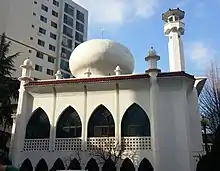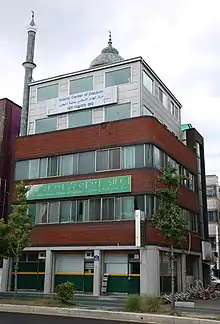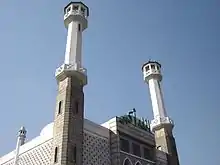List of mosques in South Korea
This is a list of mosques in South Korea.
| Name | Images | Location | Year/century | Remarks |
|---|---|---|---|---|
| Busan Al-Fatah Mosque 한국 이슬람 부산성원 |  | Busan | 1980 | This was built after the Seoul Mosque with the help of generous donations from Korean Muslims. |
| Islamic Center of Daejeon 대전 이슬라믹 센터 |  | Daejeon | 2006 | This is the third Mosque to be built in South Korea. |
| Seoul Central Mosque 서울 중앙 성원 |  | Seoul | 1976[1] | The first mosque in South Korea. The Korean government offered public land for the site. The architecture is influenced by foreign Islamic cultures. The hidden and exposed decorations used in the building are retrieved from multiple Islamic countries. The mosque was built in 1976, mostly as a gesture to attract engineers and investors from the Arab world (Economist, 2019). It has been said that the Mosque is a source of attracting immigrants and is mostly invested by Saudi Arabia. Due to the presence of Seoul mosque, the Itaewon district consists of many halal restaurants and grocery stores. You can visit the Mosque to learn about Islam and Islamic cultures. The Mosque consists of an office and meeting room on the first floor, male prayer hall in the second floor and the third floor is for women. One problem the Mosque initially faced was the nonattendance for prayer, including the attendance of the important Friday prayer. The population that frequents this mosque mostly consists of Non-Korean. Foreign Muslim leaders also contributed to the Masjid through donations and showing support towards the Korean Muslim community. Yet even the appearance of cultural diversity at Seoul Mosque has diminished in recent years: as the foreign Muslim population in and around Seoul has stabilized, Muslims have become polarized according to regions, theological differences, linguistic groups, and other socio-cultural factors (Ahn 2015, 172). “In 2015, the Turkish government promised to take full charge of rebuilding Seoul Mosque” (Song, 2016). “Today, the cosmopolitanism of Muslim public gatherings for Friday prayer serves to highlight the remarkable invisibility of Korean Muslims. Thus, the regional and cultural diversity of Islam in Korea occurs in the paradoxical context of the deficiency of Korean Muslims in Korean Islam” (Song, 2016). Unfortunately, due to the lack of Muslim population the small community was having trouble growing.
The building of this religious building has bought some changes to the area. The Seoul Central Mosque is a place of religious, and Islamic rules and customs should be respected if visiting. This includes but is not limited to wearing attire that covers the entire body, and refraining from smoking. Non-Muslims may enter the mosque, but should refrain from taking photos or exhibiting any behavior that may disrupt worshipers” (Visit Seoul.net). |
See also
- Islam in South Korea
- Lists of mosques
References
| Wikimedia Commons has media related to Mosques in South Korea. |
- Heon Choul Kim (2008). The Nature and Role of Sufism in Contemporary Islam: A Case Study of the Life, Thought and Teachings of Fethullah Gulen. ProQuest. pp. 1–. ISBN 978-0-549-70579-6. Retrieved 5 July 2012.
This article is issued from Wikipedia. The text is licensed under Creative Commons - Attribution - Sharealike. Additional terms may apply for the media files.